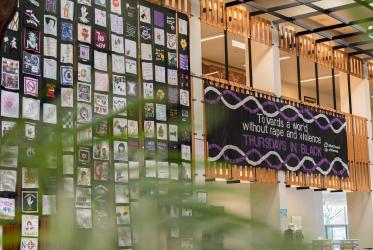Through adoption of a resolution in support of the Thursdays in Black campaign in August, the Evangelical Lutheran Church in America (ELCA) Churchwide Assembly has publicly affirmed the church’s commitment to fostering gender justice. The action is a significant official step that now formally “calls upon all people across all expressions of the church to participate in the #ThursdaysinBlack campaign by wearing black on Thursdays and actively participating in the various reflection and action items.”
With 3.4 million baptized members in 9,091 ELCA congregations, there will be many more people donning black once a week in an effort to realize, together, a world free from rape and violence, and more people engaged in working to address the issue in church and society.
The resolution marks an extension of the church’s existing policies and social teaching against gender-based violence.
Growing the grassroots

Bishop Elizabeth A. Eaton giving a report at the assembly. Photo: ELCA
ELCA Presiding Bishop Elizabeth A. Eaton - the first woman to serve in this leadership role - shared her thoughts on why the color of one’s clothing can serve as both a personal statement and a global example.
“Each Thursday, when I wear black clothing and put on my button, I am reminded that I do so as part of a growing movement,” Eaton said. “In the same way, the formal action of the 2019 ELCA Churchwide Assembly to affirm the Thursdays in Black Campaign served to reinforce our church’s commitment to ending rape and gender-based violence as one we share with Christians worldwide.”
It's a simple yet powerful witness, she added. “By raising awareness, accompaniment, and advocacy across our church about this scourge – and by claiming that we do this as part of the global ecumenical movement – we are taking important steps in our pilgrimage of justice and peace.”
Carlos Peña, former ELCA vice president, and member of the World Council of Churches’ central committee, defines gender-based violence as a hate crime that affects both men and women, and as the most human rights violation in the world.
“We are indeed blessed to be a part of a church and in partnership with other ecumenical organizations that heed God's call to work towards eliminating all forms of sexual and gender-based violence in church and society,” said Peña. “In addition, the Thursdays in Black campaign is a show of solidarity with partner churches and our global ecumenical family.”
Building momentum
In 2015, the ELCA Church Council approved the social message “Gender-based Violence,” which, at that time, drew what Dr Mary Streufert describes as a “groundswell of enthusiasm, affirmation, and hope from a variety of synod offices, congregations, and individuals.”
Streufert, who serves as the ELCA’s director for Justice for Women, added that people who had experienced sexual and gender-based violence felt as if their church became a witness to their struggles - as well as a potential ally in creating safety and accountability.
Since then, the ELCA has been widening that commitment via both church policies and creative expression. “Some congregations have used the social message for adult study classes,” explained Streufert. “Some congregations support efforts to help people in crisis, such as through supplies and donations to shelters and hotlines and logistical aid.”
The ELCA also used the social message to guide its efforts to shape national and state legislation and policy related to sexual and gender-based violence.

Photo: ELCA
It’s important to engage young people because they experience the highest rates of sexual and gender-based violence and are crucial to the witness and work, urged Streufert. The ELCA engages seminary students and pastors in workshops, and also provides opportunities for study and conversation with teens and their mentors. “We have also made a study guide for young adults available and we supply congregations with free resources, such as bulletin inserts and worship suggestions,” said Streufert.
While awareness has definitely risen, Streufert believes there is more to be done. “We particularly want to assist in strengthening awareness, response, and prevention in all expressions of the ELCA—in synods, congregations, and the churchwide organization,” she said. “And we also want to see ELCA-affiliated institutions and individuals feel as if they have a resource in the message to guide their decisions.”
As the ELCA continues on that path, Streufert believes that people wearing black on Thursdays serves as a signal to the world that we can insist on gender justice for our family members, our neighbors, ourselves. “Thursdays in Black is a vital and visible reminder that the ELCA is committed to addressing sexual and gender-based violence because someone is suffering from it, and we are called to respond to the suffering of all neighbors,” she said.
Building the movement
These ELCA commitments will also be lived out in the broader Christian family, as part of the global ecumenical movement. “Doing this as part of the World Council of Churches is an affirmation that our work as the ELCA to address gender-based violence is additive with others – as part of our pilgrimage of justice and peace,” said Kathryn Lohre, ELCA executive for Ecumenical and Inter-Religious Relations.

Photo: ELCA
Bishop Don Kreiss, of the Southeast Michigan Synod and chair of the ELCA Conference of Bishops’ Ecumenical and Inter-Religious Relations Committee, said he believes that Thursdays in Black will serve as an ever-stronger visual reminder of the sheer number of people who care about gender justice.
“It’s also a powerful sign of the critical importance of people of good will working together for the health and safety of our entire human family,” said Kreiss.
Learn more about Thursdays in Black








